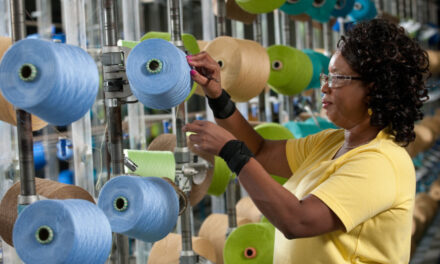 A major European apparel brand has pulled out all of its garment orders from the Philippines as it moved to more cost-competitive ASEAN countries, according to the Confederation of Wearable Exporters of the Philippines (CONWEP).
A major European apparel brand has pulled out all of its garment orders from the Philippines as it moved to more cost-competitive ASEAN countries, according to the Confederation of Wearable Exporters of the Philippines (CONWEP).
In an interview, Confederation of Wearable Exporters of the Philippines (CONWEP) Executive Director Maritess Jocson-Agoncillo said the relaunch of the scoping studies for a Philippines-European Union (EU) free trade agreement (FTA) is very timely for country’s wearables industry as it just lost orders from a major European brand. ‘It’s a European brand that pulled out from the Philippines. This brand totally diverted the Philippine orders to Vietnam and Cambodia,’ Jocson-Agoncillo said.
She said the pullout of the European brand is affecting around 4,800 to 6,000 workers in the industry.
‘Because this brand, even if it’s a European brand, we ship it all over the world. It’s not just for the European market,’ she said.
Jocson-Agoncillo explained that Vietnam currently has an FTA with the EU, allowing it to enjoy zero tariffs for its exports to the European market. The CONWEP official also highlighted the country’s higher minimum wages compared to Vietnam and Cambodia. ‘Compared to Cambodia, Vietnam, we’re reaching $8 minimum wage already. My competitors are at $6 and $7 a day. We’re getting uncompetitive,’ she said.
In a press briefing, Trade Undersecretary and Board of Investments (BOI) managing head Ceferino Rodolfo said that a PHL-EU FTA with more liberalized rules of origin will benefit wearables exports.
‘The average tariff for wearables is 12 percent, so it’s a bit high. That’s why we foresee that under an FTA with a more liberalized rules of origin, one of the sectors that will surge would be garments and wearables,’ Rodolfo said.
Jocson-Agoncillo shared the same sentiment, noting that the wearable sector which covers apparel, shoes, bags and textiles, currently experiences limited market access under the EU generalized scheme of preferences (GSP) due to rules of origins issues.
‘So, if an FTA happens, and that the market issue for some restrictive manufacturing sectors like ours, which is still under a GSP Rules of Origin coverage, that would free it up,’ Jocson-Agoncillo said.
On the sidelines of the briefing, Jocson-Agoncillo said the industry’s export value to the European market is currently around $200 mn and could grow further amid the FTA negotiations and when the agreement is implemented.
‘We’re doing $200 mn now for the European market. So easily, we can push it up to $600 mn in the first two years, three years of negotiation,’ she said. She said this export value could be pushed up to $800 mn to $1 bn in the first two years of actual implementation.
In terms of jobs, Jocson-Agoncillo said that an additional 120,000 to 250,000 new jobs could be created in the first two years of the FTA by the industry. Jocson-Agoncillo said Europe is currently the wearables industry’s third largest market for exports following the US and Japan.

















